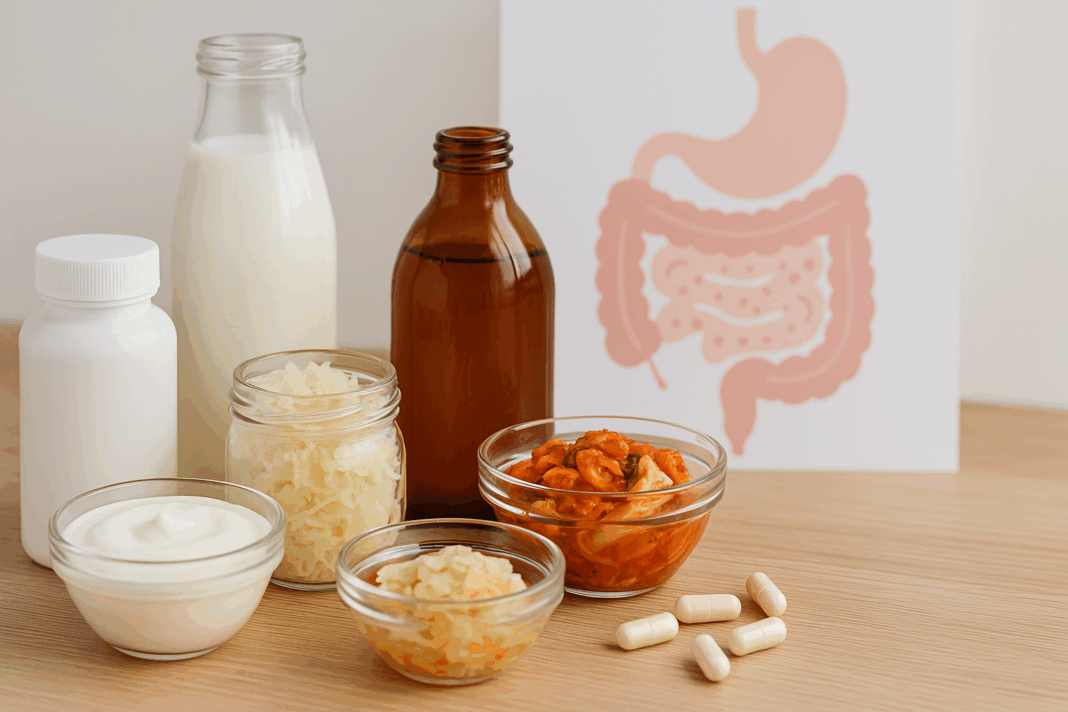In recent years, probiotics have become a central focus in the wellness community, and for good reason. Backed by emerging scientific evidence and growing consumer awareness, these beneficial microorganisms are now widely recognized for their powerful effects on digestive and immune health. Whether incorporated through fermented foods, probiotic supplements, or fortified beverages, the 10 benefits of probiotics are transforming the way we approach preventive health. This comprehensive guide unpacks the science behind probiotics, explores their wide-ranging advantages, and offers practical advice for choosing the best probiotic for your needs, all while adhering to the highest standards of scientific accuracy and reader accessibility.
You may also like: The Ultimate Guide to Choosing an Effective Immune Support Supplement for Daily Wellness

Understanding Probiotics: What They Are and How They Work
To appreciate the profound impact of probiotics, it is essential first to understand what they are. Probiotics are live microorganisms—primarily bacteria and yeasts—that, when administered in adequate amounts, confer a health benefit on the host. The most common types of probiotic bacteria belong to the Lactobacillus and Bifidobacterium genera, though other types like Saccharomyces boulardii (a beneficial yeast) also play important roles. These organisms are naturally present in the human gastrointestinal tract but can also be ingested through food or supplements.
Probiotics work primarily by maintaining and restoring the balance of gut microbiota, a complex ecosystem of trillions of microorganisms residing in the digestive tract. Disruptions to this balance—due to factors such as antibiotic use, poor diet, or stress—can lead to a cascade of health issues ranging from digestive problems to systemic inflammation. By colonizing the gut, probiotics compete with harmful bacteria for space and nutrients, produce antimicrobial substances, and modulate immune responses. In doing so, they enhance not only gut health but also systemic immunity, mental well-being, and metabolic function.
What Do Probiotics Do? A Functional Overview
Many people often ask, “What do probiotics do?” The answer is multifaceted. At the most basic level, probiotics support digestion by breaking down food substances that our bodies alone cannot process. For instance, certain strains of Lactobacillus can help digest lactose, making dairy products more tolerable for those with lactose intolerance. They also produce short-chain fatty acids (SCFAs) like butyrate, which nourish colon cells and maintain intestinal barrier integrity.
Additionally, probiotics play a significant role in modulating the immune system. They stimulate the production of regulatory T-cells and enhance the activity of natural killer cells, creating a more robust immune response. This immune modulation extends beyond gut immunity and can influence systemic inflammation and autoimmune conditions. Probiotics also interact with the gut-brain axis, a bidirectional communication system between the gastrointestinal tract and the central nervous system. Through this pathway, they can affect neurotransmitter production, mood regulation, and cognitive function.
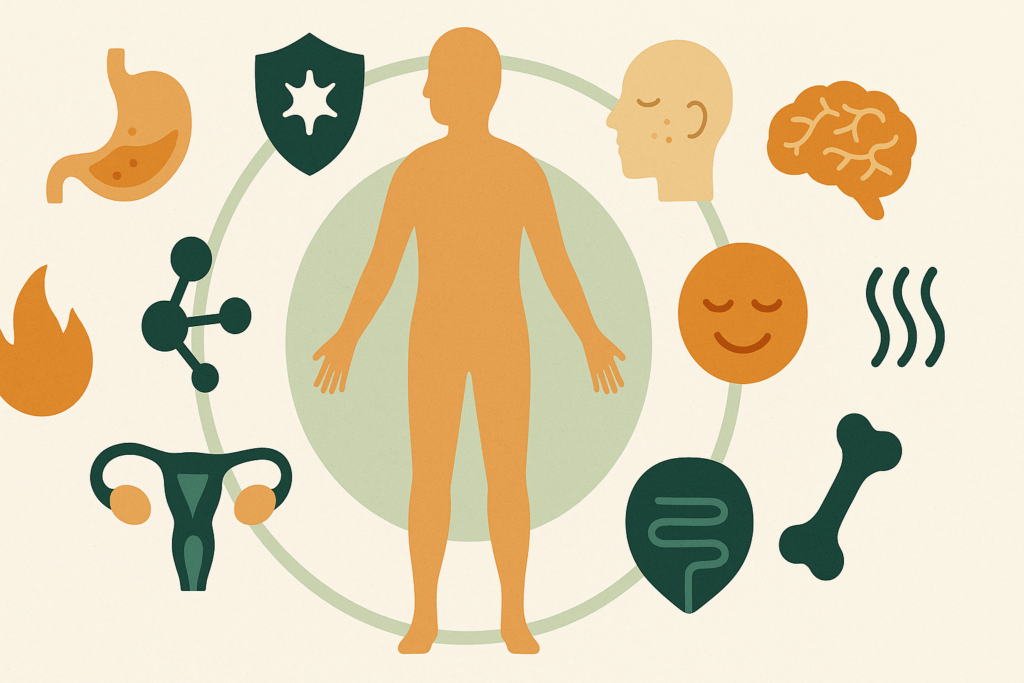
10 Benefits of Probiotics for Holistic Health
Understanding the 10 benefits of probiotics provides insight into why these microorganisms are heralded as essential for modern health. First, probiotics promote regular bowel movements and reduce symptoms of constipation and diarrhea, offering relief from irritable bowel syndrome (IBS). Second, they help restore gut flora following antibiotic use, preventing complications like antibiotic-associated diarrhea and Clostridioides difficile infections.
Third, probiotics enhance immune function, reducing the frequency and severity of respiratory tract infections. Fourth, they play a critical role in preventing and managing allergies by modulating immune responses, particularly in early life. Fifth, probiotics improve nutrient absorption, including essential vitamins like B12 and K2, and minerals such as calcium and magnesium.
Sixth, they support mental health by producing neurotransmitters like serotonin and influencing the gut-brain axis. Seventh, probiotics assist in weight management by modulating appetite hormones and improving metabolic function. Eighth, they reduce systemic inflammation, which is implicated in numerous chronic diseases such as cardiovascular conditions and type 2 diabetes.
Ninth, probiotics contribute to clearer skin by addressing conditions like acne, eczema, and rosacea from the inside out. Finally, the tenth benefit is improved vaginal health, as specific strains maintain the pH balance and prevent infections like bacterial vaginosis and yeast overgrowth. Collectively, these advantages of probiotic supplements underscore their role as a foundational pillar in integrative health.
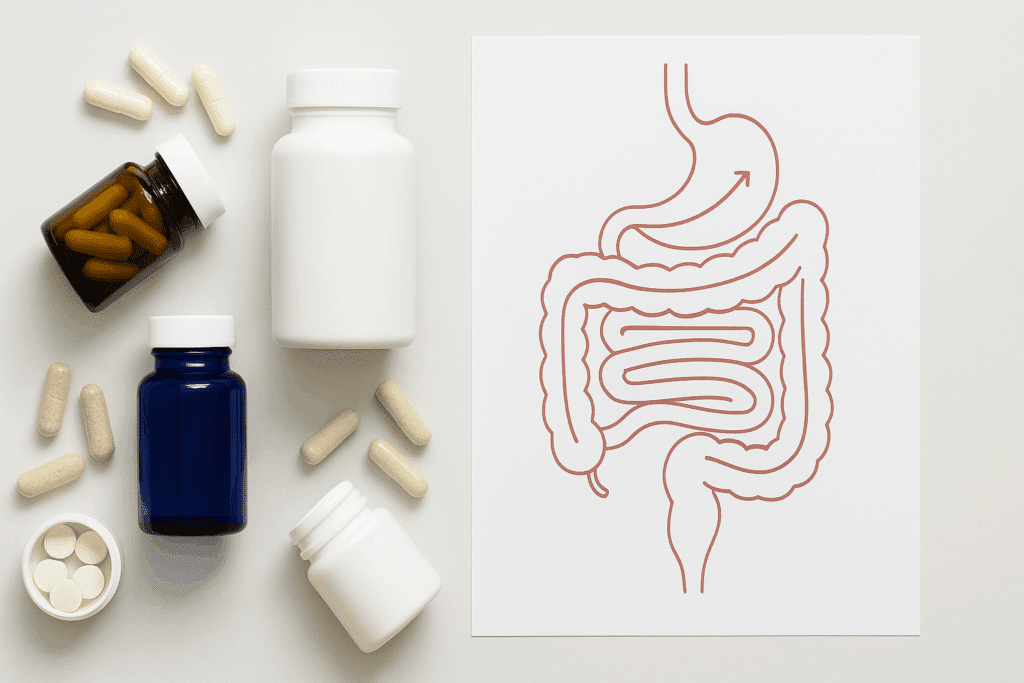
Probiotic Supplements for Gut Health: How to Choose Wisely
Navigating the world of probiotic supplements for gut health can be overwhelming given the plethora of products on the market. The key to choosing the best probiotic lies in understanding the strain-specific effects and clinical evidence supporting each formulation. Not all probiotics are created equal; different strains exert different health benefits, so it is crucial to match the strain to your health goals. For example, Lactobacillus rhamnosus GG is effective for treating diarrhea, while Bifidobacterium longum BB536 supports immune modulation.
When evaluating probiotic supplements, look for products that specify the strain, dosage (measured in colony-forming units, or CFUs), and storage requirements. A minimum of 1 billion CFUs per serving is typically recommended, but some conditions may require higher dosages. It is also important to choose supplements with evidence-backed formulations that have been tested in human clinical trials.
Equally vital is the delivery system. Probiotics must survive the acidic environment of the stomach to reach the intestines, where they exert their effects. Look for enteric-coated capsules, delayed-release formulations, or spore-based probiotics that offer enhanced survivability. Additionally, opt for brands that adhere to Good Manufacturing Practices (GMP) and provide transparent labeling and third-party testing to ensure product integrity and potency.
Advantages of Probiotics in Everyday Nutrition
Incorporating probiotics into your daily routine doesn’t always require supplements. Fermented foods like yogurt, kefir, sauerkraut, kimchi, miso, and kombucha are rich sources of natural probiotics. These functional foods not only deliver live beneficial microbes but also come packaged with complementary nutrients like fiber, enzymes, and bioactive compounds.
Consuming a variety of probiotic-rich foods diversifies the gut microbiome, which is associated with better resilience against infections, enhanced metabolic function, and reduced inflammation. Furthermore, pairing probiotics with prebiotics—non-digestible fibers that feed beneficial bacteria—creates a synergistic effect known as synbiotic therapy. Foods like garlic, onions, leeks, asparagus, and bananas are excellent prebiotic sources.
Including probiotics in everyday nutrition has far-reaching implications for public health. In populations with high processed food intake and low dietary fiber, integrating probiotic foods can help re-establish microbial balance, improving digestion and immune function. Additionally, probiotics play a preventive role by reducing the incidence of gastrointestinal diseases, respiratory infections, and even some allergic conditions.
Are Probiotics Good for You? Debunking Common Myths
Despite their growing popularity, many people still ask, “Are probiotics good for you?” The answer, supported by a growing body of clinical evidence, is a resounding yes. However, it is equally important to address common myths and misconceptions that may deter individuals from incorporating probiotics into their health regimen.
One prevalent myth is that all bacteria are harmful. In reality, the human body relies on beneficial bacteria for a range of physiological functions. Another misconception is that probiotic supplements are unnecessary if you eat a healthy diet. While diet plays a crucial role in gut health, factors such as antibiotic use, environmental toxins, and chronic stress can deplete beneficial bacteria, making supplementation beneficial.
There is also confusion about whether probiotics are safe for everyone. While generally safe for most people, individuals with compromised immune systems or critical illnesses should consult a healthcare provider before beginning supplementation. Importantly, probiotics are not a cure-all. They are best viewed as a complementary strategy within a broader wellness framework that includes a balanced diet, regular exercise, and adequate sleep.
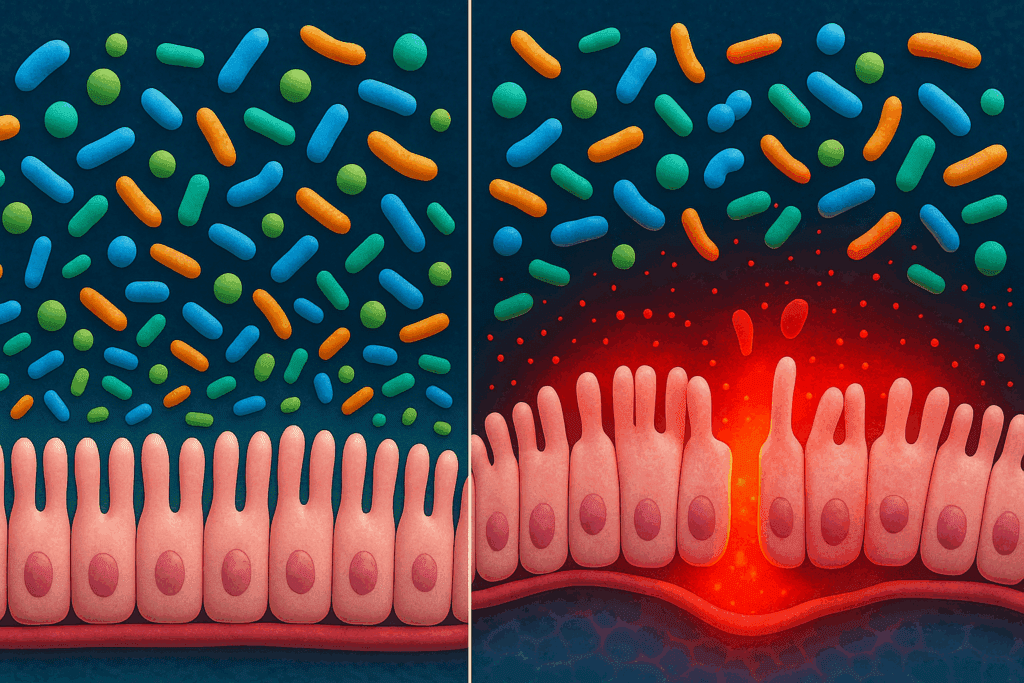
Probiotics for Gut Health: A Closer Look at the Science
Gut health is a cornerstone of overall well-being, and probiotics play a pivotal role in maintaining this delicate balance. The gut microbiome acts as a dynamic interface between the external environment and internal physiology, influencing digestion, immunity, and even behavior. Disruptions to this microbiome can trigger a range of conditions from leaky gut syndrome and food intolerances to inflammatory bowel disease and metabolic dysfunction.
Scientific studies have shown that specific probiotic strains can restore microbial equilibrium by inhibiting the growth of pathogenic bacteria and promoting beneficial species. This balance is vital for the integrity of the intestinal barrier, which prevents toxins and undigested food particles from entering the bloodstream. By reinforcing this barrier, probiotics reduce systemic inflammation and support immune surveillance.
Furthermore, probiotics enhance enzymatic activity and bile acid metabolism, which aids in nutrient absorption and fat digestion. They also influence the production of gut-derived neurotransmitters such as serotonin, which affects mood and stress resilience. As such, probiotics offer a multifaceted approach to gut health, providing both preventive and therapeutic benefits for a wide array of digestive and systemic conditions.

What Do Probiotics Do for Women? Gender-Specific Benefits
Women’s health presents unique challenges that can benefit significantly from targeted probiotic support. So, what do probiotics do for women specifically? For starters, probiotics help maintain vaginal microbiota by promoting the dominance of Lactobacillus species, which lower pH levels and inhibit the growth of pathogens. This balance is crucial for preventing infections such as bacterial vaginosis and yeast overgrowth.
Probiotics also support urinary tract health by reinforcing the barrier against uropathogens, reducing the frequency of recurrent urinary tract infections. Hormonal fluctuations during menstruation, pregnancy, and menopause can disrupt gut and vaginal microbiota. Probiotics help stabilize these shifts, improving mood, digestion, and immune function during hormonal transitions.
Additionally, emerging research suggests that probiotics may support bone density and cardiovascular health in postmenopausal women by modulating calcium absorption and reducing inflammation. Probiotics also play a role in skin health, which is often influenced by hormonal changes. Taken together, these benefits highlight the importance of gender-specific probiotic formulations that address the distinct physiological needs of women.
Why Are Probiotics Good for You? Scientific and Practical Insights
The question “Why are probiotics good for you?” invites a deeper exploration of their underlying mechanisms and real-world implications. From a scientific standpoint, probiotics are beneficial because they enhance microbial diversity, which is a key indicator of a healthy microbiome. Greater diversity equates to better resilience against infections, improved nutrient metabolism, and reduced inflammation.
Probiotics also act as immunomodulators, helping to fine-tune immune responses. This is particularly relevant in autoimmune conditions, where the immune system mistakenly attacks healthy tissues. By promoting regulatory T-cell activity and reducing pro-inflammatory cytokines, probiotics help restore immune balance. Practically speaking, this means fewer infections, quicker recovery from illness, and improved quality of life.
Moreover, probiotics are accessible, versatile, and safe for long-term use. They can be tailored to individual needs through specific strains, dosages, and delivery formats. Whether you are an athlete looking to optimize performance, a senior aiming to enhance immunity, or a busy professional seeking digestive relief, there is likely a probiotic formulation suited to your lifestyle.
The Health Benefits of Probiotics Across the Lifespan
The health benefits of probiotics extend across all stages of life, from infancy to old age. In infants, probiotics support the development of a healthy microbiome, which is critical for immune programming and allergy prevention. Certain strains like Bifidobacterium infantis are particularly beneficial for breastfed infants, enhancing digestion and immune defense.
In adolescence and adulthood, probiotics assist with managing acne, enhancing mood, and supporting metabolic health. They also offer protective effects against lifestyle-induced imbalances such as high-fat diets and chronic stress. For older adults, probiotics help counteract the age-related decline in microbial diversity and immune function, reducing the risk of infections, inflammation, and cognitive decline.
Moreover, probiotics support bone health by increasing calcium absorption and reducing bone resorption. They also enhance nutrient bioavailability, which is crucial for aging populations with diminished digestive efficiency. These age-specific benefits make probiotics a valuable addition to health strategies tailored for different life stages.
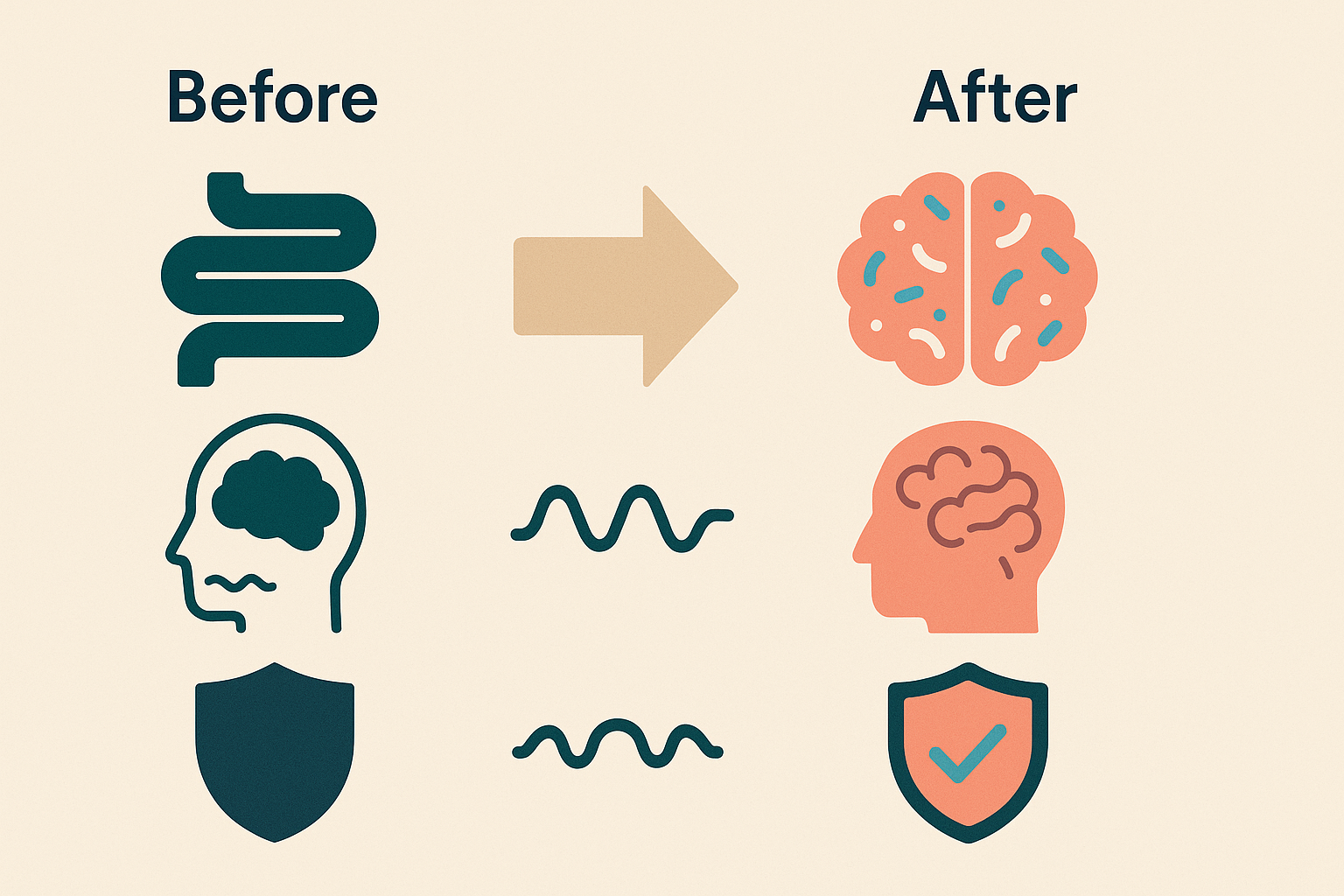
Do Probiotics Actually Work? Evaluating the Evidence
Skepticism about supplements is healthy and necessary, prompting many to ask, “Do probiotics actually work?” The answer depends on several variables, including the specific strains used, dosage, duration, and the individual’s health condition. Numerous clinical trials have demonstrated the efficacy of probiotics in treating and preventing gastrointestinal disorders, enhancing immune response, and improving mental health outcomes.
For example, probiotics have been shown to reduce the duration and severity of acute infectious diarrhea, alleviate symptoms of IBS, and decrease the frequency of upper respiratory tract infections. Additionally, several studies have highlighted their role in managing depression and anxiety by modulating the gut-brain axis. These outcomes are not anecdotal; they are supported by rigorous research and meta-analyses.
However, effectiveness varies. A probiotic that works for one person may not yield the same results for another due to differences in baseline microbiota, genetics, and lifestyle factors. This underscores the importance of personalized probiotic therapy guided by clinical insights and ongoing self-monitoring. Ultimately, when chosen and used correctly, probiotics do work for a wide range of applications.
Who Should Take Probiotics? Identifying Ideal Candidates
While probiotics can be beneficial for most individuals, certain populations stand to gain the most from targeted supplementation. People with gastrointestinal disorders such as IBS, Crohn’s disease, or ulcerative colitis often experience microbial imbalances that can be alleviated with probiotics. Similarly, individuals recovering from antibiotic therapy benefit significantly from probiotic supplementation to restore gut flora and prevent secondary infections.
Those with weakened immune systems, whether due to illness, chemotherapy, or aging, may also find that probiotics enhance immune function and reduce the incidence of infections. Women experiencing recurrent urinary or vaginal infections can benefit from strains specifically targeting urogenital health. Even athletes who undergo intense physical exertion benefit from probiotics by maintaining gut integrity and reducing inflammation.
Additionally, people with metabolic syndrome or type 2 diabetes may experience improved insulin sensitivity and lipid profiles with probiotic use. Children prone to allergies and eczema also show positive responses to early probiotic intervention. Given these diverse applications, the question “do I need a probiotic?” can be answered affirmatively for many individuals, provided the choice is informed and tailored to specific health needs.
What Does a Probiotic Do in Clinical Context?
Understanding what does a probiotic do from a clinical perspective provides a more nuanced view of its therapeutic potential. In clinical settings, probiotics are used as adjunctive treatments for conditions like antibiotic-associated diarrhea, small intestinal bacterial overgrowth (SIBO), and Helicobacter pylori infections. They are also explored for their benefits in liver disease, including non-alcoholic fatty liver disease (NAFLD), by modulating gut-derived endotoxins.
Probiotics are also employed to manage symptoms of functional gastrointestinal disorders such as bloating, flatulence, and abdominal pain. In pediatric care, they are used to prevent necrotizing enterocolitis in preterm infants, a life-threatening condition associated with an underdeveloped gut barrier. Probiotic interventions are increasingly being incorporated into mental health treatment protocols for depression, anxiety, and cognitive decline, particularly in the elderly.
These applications underscore the expanding role of probiotics beyond general wellness into targeted therapeutic realms. With continued research and standardized clinical protocols, probiotics are poised to become integral components of evidence-based medicine.
Do Probiotics Help with Digestion? Digestive Function in Focus
One of the most frequently asked questions is, “Do probiotics help with digestion?” The answer lies in the foundational role these microorganisms play in maintaining gut function. Probiotics enhance the breakdown of food particles, produce digestive enzymes, and increase the bioavailability of nutrients. They also contribute to the fermentation of non-digestible fibers, producing SCFAs that nourish colonocytes and regulate bowel movements.
For individuals with lactose intolerance, specific probiotic strains like Lactobacillus acidophilus aid in lactose digestion, reducing symptoms such as bloating, cramps, and gas. Probiotics also compete with gas-producing bacteria, thereby minimizing discomfort associated with fermentation in the colon. Their role in maintaining intestinal motility further supports regularity and prevents constipation.
In cases of indigestion and heartburn, probiotics can help by balancing stomach acid levels and supporting mucosal barrier integrity. They also reduce the likelihood of small intestinal bacterial overgrowth, a condition that impairs nutrient absorption and leads to digestive distress. Therefore, incorporating probiotics into one’s routine offers a comprehensive strategy for optimizing digestive health.
Probiotics and Stomach Pain: A Symptom-Specific Analysis
Stomach pain is a common complaint that can stem from various underlying causes, including infection, inflammation, or dysbiosis. Probiotics for stomach pain work by addressing these root issues. For instance, certain strains reduce visceral hypersensitivity, the heightened perception of pain from the gut, which is common in IBS.
By reinforcing the gut barrier, probiotics prevent the translocation of toxins and pathogens that can trigger immune responses and pain. They also produce antimicrobial peptides that suppress the growth of harmful bacteria, reducing irritation and inflammation. In conditions like gastritis, probiotics modulate cytokine production, leading to symptom relief.
Furthermore, probiotics support the production of mucin, a protective glycoprotein layer that lines the stomach and intestines. This layer acts as a buffer against stomach acid and irritants. Regular use of probiotics can reduce the severity and frequency of stomach discomfort, offering a non-pharmacological approach to managing gastrointestinal symptoms.
The Advantages of Probiotic Supplements in Clinical Nutrition
Beyond food sources, the advantages of probiotic supplements lie in their standardized dosage, targeted delivery, and strain specificity. Unlike fermented foods, which vary in probiotic content, supplements offer precise CFUs and strain identification, making it easier to match them to specific health goals. This reliability is especially valuable in clinical nutrition, where consistency is critical.
Probiotic tablets benefits include convenience and stability, as many are formulated to withstand heat and stomach acid. This ensures higher survivability and colonization rates in the intestines. Probiotic pills benefits also extend to those with dietary restrictions or allergies who may not tolerate fermented foods.
Additionally, supplements can be enriched with other bioactive ingredients such as prebiotics, vitamins, or digestive enzymes, enhancing their overall efficacy. For healthcare providers and patients alike, these formulations provide a versatile, research-backed tool for addressing a wide range of health concerns with precision and effectiveness.
Probiotics Foods vs. Supplements: Making the Right Choice
When deciding between probiotics foods and supplements, the best approach often involves a combination of both. Fermented foods offer a rich array of naturally occurring strains along with other nutrients, while supplements provide standardized doses and targeted formulations. Each has its advantages depending on individual preferences, health goals, and lifestyle factors.
For those new to probiotics, starting with foods like yogurt, kefir, or kimchi can be an enjoyable and effective introduction. Is probiotic yogurt good for you? Yes, particularly when it contains live and active cultures and minimal added sugars. However, people with lactose intolerance or dairy allergies may need to seek alternative sources such as coconut yogurt or non-dairy kefir.
Supplements are particularly useful during periods of illness, stress, or travel, when maintaining microbial balance is more challenging. They are also recommended for people with specific health conditions requiring higher probiotic concentrations or tailored strain profiles. Ultimately, the decision should be informed by personal needs and, where possible, guided by professional advice.
What Does Probiotics Do for Women’s Wellness? Expanded Insights
Building on earlier discussions, let us revisit what does probiotics do for women with an expanded lens. In addition to supporting vaginal and urinary tract health, probiotics influence hormonal balance by modulating estrogen metabolism through the estrobolome—a collection of gut bacteria involved in processing estrogen. Balanced estrogen levels are crucial for reproductive health, mood stability, and bone density.
Probiotics also support thyroid function, which is intricately linked to metabolism, energy levels, and menstrual health. Certain strains help reduce thyroid autoimmunity by regulating the gut-immune axis. For pregnant women, probiotics offer protection against gestational diabetes, preeclampsia, and postpartum depression by reducing inflammation and stabilizing blood sugar levels.
Moreover, during menopause, probiotics alleviate symptoms such as hot flashes and mood swings by supporting adrenal function and neurotransmitter balance. They also promote skin elasticity and hydration, enhancing overall appearance. These multifaceted benefits make probiotics a powerful ally in women’s wellness across all life stages.
Frequently Asked Questions: Probiotics and Your Health
What are the lesser-known 10 benefits of probiotics beyond digestion and immunity?
Beyond their commonly cited roles in digestive and immune support, the 10 benefits of probiotics extend into areas often overlooked. For example, probiotics help metabolize environmental toxins by supporting liver enzymes responsible for detoxification. They can also improve oral health by balancing the oral microbiome, reducing bad breath and gum inflammation. Some strains may even play a role in cholesterol metabolism, helping to lower LDL levels naturally. Additionally, probiotics enhance the skin’s barrier function, potentially reducing sensitivity and improving resilience against environmental irritants. Recent studies suggest they may aid in muscle recovery by lowering exercise-induced oxidative stress, offering athletes an edge in performance and recovery.
How do the advantages of probiotic supplements differ from food-based probiotics?
The advantages of probiotic supplements over probiotic-rich foods center on specificity and potency. Supplements often contain well-researched strains in standardized dosages, allowing for targeted health interventions—something difficult to achieve consistently through food alone. Many probiotic supplements for gut health also use encapsulation technologies that protect bacteria from stomach acid, ensuring greater viability upon reaching the intestines. In contrast, fermented foods like yogurt or kimchi offer broader microbial diversity but may lack strain transparency or therapeutic doses. Additionally, supplements are more accessible for individuals with dietary restrictions or aversions, ensuring consistent intake without relying on culinary preferences or preparation habits.
Are probiotics good for you during times of chronic stress or mental fatigue?
Yes, during periods of chronic stress or cognitive overload, probiotics can offer unexpected benefits. Scientific interest in the gut-brain axis reveals that gut probiotics influence neurotransmitter production, such as GABA and serotonin, which help regulate mood and anxiety. Certain strains—like Bifidobacterium longum and Lactobacillus helveticus—are particularly noted for their calming effects and ability to reduce cortisol levels. These benefits of taking probiotics make them valuable adjuncts to stress management strategies alongside meditation, sleep hygiene, and balanced nutrition. While not a substitute for mental health care, probiotics contribute to emotional resilience and cognitive clarity, especially when integrated with a holistic wellness plan.
Why are probiotics good for you as part of a preventive health regimen?
The question of why are probiotics good for you becomes especially relevant when considering long-term preventive care. Probiotics contribute to metabolic efficiency by influencing how your body stores fat, regulates glucose, and processes nutrients. Over time, maintaining a balanced gut microbiome can lower your risk for chronic conditions such as type 2 diabetes, cardiovascular disease, and certain inflammatory disorders. They also support mucosal immunity, offering a first line of defense against pathogens entering through the gut, nose, or mouth. Because of their broad impact on systemic health, probiotics serve as a proactive measure rather than a reactive treatment, fitting seamlessly into preventive care frameworks recommended by functional and integrative health practitioners.
What do probiotics do for women beyond reproductive health?
While often marketed for vaginal and urinary health, the question of what do probiotics do for women deserves a broader scope. For instance, probiotics can influence thyroid function, which is especially significant in women who are disproportionately affected by thyroid disorders. They also support collagen synthesis and hydration in skin, making them relevant in beauty and dermatological contexts. During pregnancy, probiotics may lower the risk of gestational diabetes and postpartum depression by moderating inflammation and stabilizing microbiota shifts. Emerging research even explores their role in breast health, as some gut-derived compounds influence estrogen metabolism. Therefore, the advantages of probiotics for women go well beyond reproductive wellness, supporting endocrine, dermatologic, and emotional health as well.
Do probiotics really work if you have no digestive issues?
Yes, probiotics do work even in the absence of noticeable digestive symptoms. Many people take gut probiotics preventively to maintain microbial diversity, which is linked to overall resilience and immune readiness. Subclinical imbalances in the microbiome can influence energy levels, hormone balance, and inflammation, even in individuals without overt gastrointestinal complaints. Furthermore, probiotics help the body adapt to modern lifestyle stressors such as poor diet, environmental toxins, and sleep deprivation. Incorporating them into a daily routine supports systemic equilibrium and reduces the likelihood of developing chronic conditions. As such, probiotics are not just for symptomatic relief—they are an investment in long-term physiological stability.
Can probiotics help reduce food sensitivities and allergic responses?
Probiotics have shown promise in addressing food sensitivities and certain allergies by modulating immune responses and improving gut barrier function. When the intestinal lining becomes permeable (a condition often referred to as “leaky gut”), undigested food particles can trigger exaggerated immune reactions. By strengthening the epithelial barrier and enhancing tight junctions, probiotic supplements for gut health can reduce this permeability. Additionally, certain strains help rebalance Th1/Th2 immune responses, which are often dysregulated in allergic individuals. While not a cure, consistent use of the best probiotic strains tailored to immune regulation may help individuals better tolerate a wider range of foods and reduce hypersensitivity reactions over time.
What does a probiotic do to support skin health and appearance?
Skin is an outward reflection of internal balance, and probiotics influence skin health through multiple pathways. They reduce systemic inflammation that often manifests as acne, eczema, or rosacea and promote the production of antimicrobial peptides that inhibit pathogenic skin bacteria. Internally, probiotics can enhance hydration and elasticity by improving nutrient absorption—particularly of zinc, vitamin C, and essential fatty acids. Probiotic pills benefits also include supporting detoxification, which indirectly benefits skin by reducing the burden on excretory organs. Topical probiotic applications are also being explored, but ingestible forms provide a more holistic and lasting approach to skin rejuvenation and resilience.
Is probiotic yogurt good for you if you’re managing weight or blood sugar?
Is probiotic yogurt good for you in the context of weight or blood sugar management? The answer depends on the product formulation. While plain probiotic yogurt offers live cultures and protein, many commercial options are high in added sugars, which can undermine metabolic goals. Selecting unsweetened, full-fat yogurt with verified live cultures allows you to harness the metabolic advantages of probiotic foods without the glycemic spike. Some strains found in yogurt, like Lactobacillus gasseri, have been linked to modest reductions in belly fat and improved insulin sensitivity. Thus, probiotic yogurt can be a valuable addition to a glycemic-conscious diet—provided label reading is part of your selection process.
Understanding the 10 Benefits of Probiotics for Long-Term Wellness
The 10 benefits of probiotics are not only relevant for acute conditions but also contribute to long-term vitality and disease prevention. For instance, probiotics enhance bile acid metabolism, aiding in cholesterol regulation and fat digestion—two key concerns in aging populations. They also contribute to neurotransmitter balance, which is crucial for maintaining cognitive health in older adults. Children, too, benefit from early microbial exposure through probiotics, which shapes immune tolerance and lowers the likelihood of autoimmune disease later in life. These long-term health benefits of probiotics make them a wise choice for individuals seeking to age well and maintain independence. As more research uncovers their influence across organ systems, it becomes clear that probiotics are not a fleeting health trend but a fundamental aspect of modern preventive care.
Conclusion: Harnessing the Power of the Best Probiotic for Gut and Immune Health
In the evolving landscape of integrative health, probiotics have emerged as indispensable tools for maintaining and restoring balance within the body. From digestive support and immune modulation to mental health and hormonal regulation, the evidence supporting their use is both vast and compelling. The 10 benefits of probiotics span virtually every system in the body, offering a holistic approach to wellness that aligns with modern health demands.
Choosing the best probiotic involves understanding your unique health needs, selecting clinically validated strains, and maintaining consistency in usage. Whether obtained from probiotic foods, supplements, or a combination of both, these microorganisms offer practical and accessible solutions for improving quality of life. For those still wondering, “Do probiotics really work?” the answer is yes—provided they are selected and used judiciously.
As our understanding of the microbiome deepens, probiotics are poised to play an even greater role in personalized medicine and public health. By embracing these beneficial organisms with informed intentionality, we open the door to better digestion, stronger immunity, and enhanced overall vitality. In a world increasingly aware of the interconnectedness of health, probiotics stand out as a truly transformative force—one that invites us all to take a proactive, science-backed approach to lifelong well-being.
Further Reading:
The Ultimate Guide to Choosing the Best Probiotics for Your Gut Health
The Best Probiotics for Gut Health: A Complete Guide
11 Best Probiotic Supplements for 2025, According to Dietitians


